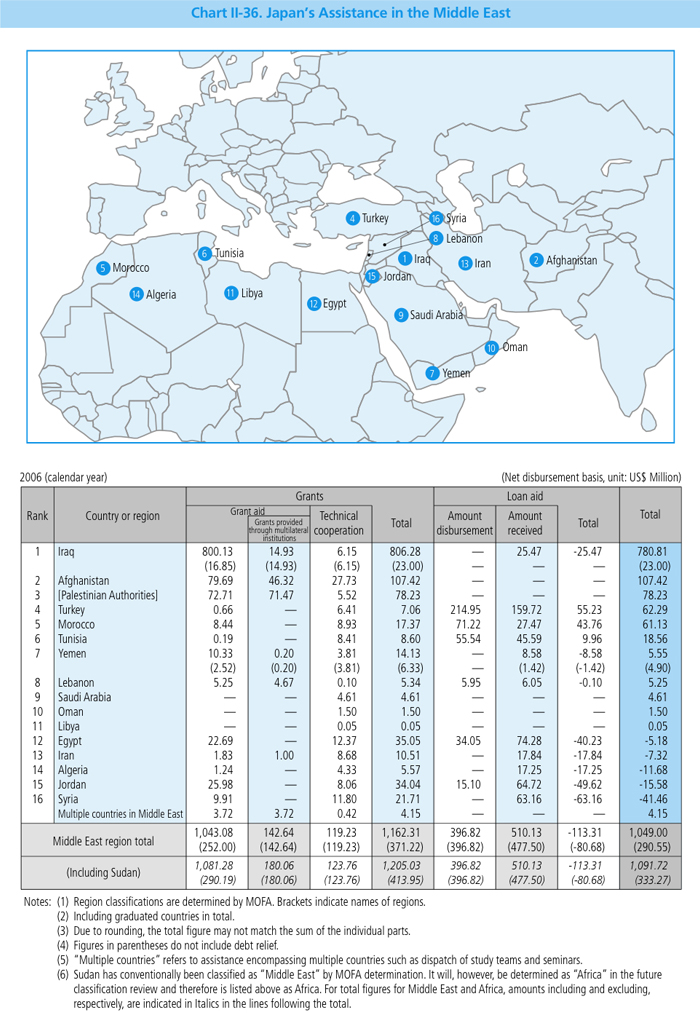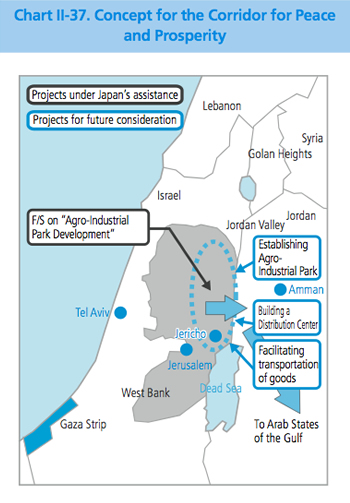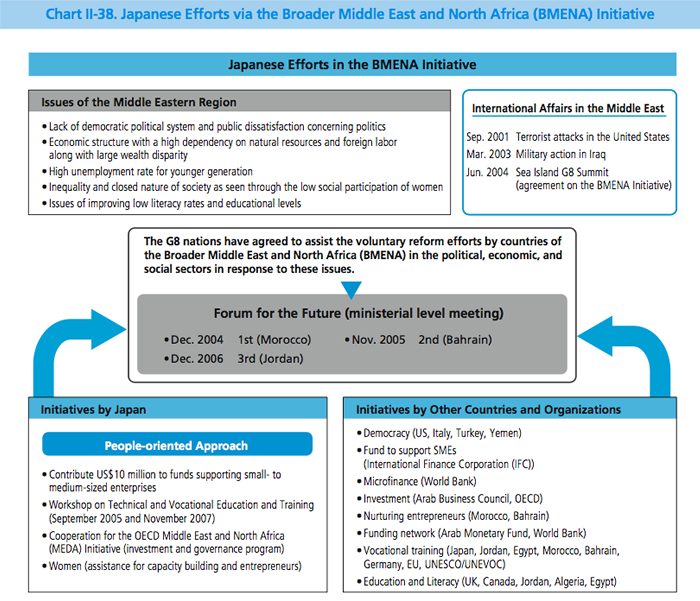Japan's Official Development Assistance White Paper 2007
Main Text > Part II ODA RECORD FOR FY2006 > Chapter 2 Details about Japan's Official Development Assistance > Section 3. Assistance for Each Region > 5. Middle East
5. Middle East
< Record for FY2006 >
Japan's bilateral assistance to the Middle East in 2006 was approximately US$1,049.00 million, 14.0% of total bilateral ODA.
< Features of the Middle East >
Peace and stability of the Middle East is crucial for the peace and stability of the entire international community since it is the world's major energy supplying region, providing 90% of Japan's oil imports. The reconstruction of Iraq and Afghanistan as well as the progress in the Middle East peace process are extremely important in avoiding destabilization of the Middle Eastern as a whole and bear vital importance in achieving peace and stability in the region. Japan continues to provide active support to the region in collaboration with the international community. In the Middle East region water resources are scarce and the securing and managing water, too, is an important challenge which has the potential to affect the stability of the region. Another major issue common to the region is the training of engineers and other human resources development. The building of socioeconomic infrastructure for development and correcting social disparities as well as measures against poverty are also important. Among the countries with natural resources, Kuwait, Qatar, the United Arab Emirates and others have achieved a certain level of economic development and have already graduated from ODA.
< Japan's Efforts >
Japan has actively provided assistance to foster social stability and economic development in the Middle East, with an emphasis on the support for peacebuilding in Iraq and Afghanistan, cooperation to support Middle East peace through support to the Palestinian Territory and surrounding Arab states, water resources management, development of economic and social infrastructure, human resources development, and environmental protection measures.
Chart II-36. Japan's Assistance in the Middle East

● Support to Iraq and Afghanistan
Japan has been providing proactive support for Iraq: assistance for humanitarian rehabilitation provided by the Self-Defense Forces, US$5 billion in ODA, US$6 billion in debt relief, and assistance for promoting national reconciliation. For Afghanistan, Japan has pledged to deliver US$1 billion by the end of March 2006, and announced additional assistance of US$450 million at the London Conference on Afghanistan held in January 2006. In total, Japan has pledged US$1.45 billion, and as of the present,12 it has provided or has decided to provide a total of US$1.24 billion.
See Section 2, for details about assistance to Iraq and Afghanistan
● Support for Peace in the Middle East
Japan's support for peace in the Middle East has included approximately US$900 million in assistance to the Palestinian Territory provided from 1993, when the current peace process was initiated, to the present; support for realizing a bilateral initiative for co-existence and co-prosperity between Israel and the Palestinian Territory; and consistent support of the peace efforts of President Mahmoud Abbas of the Palestinian Interim Self-Government Authority (PA). In March 2006, after the Hamas-led PA cabinet was established, Japan was conscious that the Hamas Cabinet had democratically-elected responsibility and called for the Cabinet to take a path toward co-existence and co-prosperity with Israel. Meanwhile Japan continued to provide humanitarian aid to the Palestinian people, and on a visit to the Palestinian Territories in July 2006, then Prime Minister Koizumi promised approximately US$30 million in humanitarian aid.
Another long-term effort toward peace in the Middle East made independently by Japan was the proposal of Corridor for Peace and Prosperity initiative that sought economic development in the Jordan Valley through cooperation among Israel, Jordan, the Palestinian Territory and Japan, and obtained the agreement of the respective leaders. Specifically, this initiative would seek the development of the region through assistance for creating agricultural and industrial estates, establishing distribution centers, and promoting distribution. Through the sharing of the benefits of these efforts, the initiative would foster bonds of trust. Since then, Japan has worked actively to give concrete form to the initiative, holding a ministerial-level conference among the four participants in Tokyo in March 2007, followed by the first administrative-level conference (in Jordan) among the four participants in June 2007, and then a ministerial-level conference in Jericho upon the visit of then Foreign Minister Taro Aso to the Palestinian Territories in August of the same year. At the above ministerial-level conference, then Foreign Minister Aso proposed construction in the agricultural and industrial estates of southern Jericho District and the continued promotion of this initiative, and the four participants gave their agreement.
With regard to assistance to the Palestinian Territory, Japan provided US$12.6 million in humanitarian aid to the Palestinian people in the form of medical care, job creation, and food supplies in March 2007. Furthermore, in light of the establishment of the Fayyad emergency Cabinet in June of the same year in response to the seizure of the Gaza Strip by Hamas, then Foreign Minister Aso indicated, during his visit, that Japan would provide a total of US$20 million in assistance, including direct assistance to the PA.

Senior Vice-Minister for Foreign Affairs Itsunori Onodera (right) receiving a courtesy call from UNRWA Commissioner-General Karen AbuZayd
Chart II-37. Concept for the Corridor for Peace and Prosperity

< Assistance through the Broader Middle East and North Africa (BMENA)13 Initiative >/span>
Through the Broader Middle East and North Africa (BMENA) initiative to support efforts to reform Middle Eastern countries, Japan is emphasizing the importance of efforts aimed at developing and utilizing people and is providing assistance on a priority basis for vocational training and education. The 3rd Forum for the Future, a forum for foreign minister-level talks among the G8 and BMENA countries, was held in Jordan in 2006. At this forum, Japan presented the specific measures it is taking, including the development of a learning system through teacher development, training centers for technical education, and IT. Other measures include the construction of schools in the Palestinian Territories, provision of teaching materials and curricula, and assistance to women for working at home using computers in Saudi Arabia.
Chart II-38. Japanese Efforts via the Broader Middle East and North Africa (BMENA) Initiative

< Cooperation with Countries that have Graduated from ODA >
Japan is a country poor in mineral and energy resources and securing such resources is one of the important foreign policy agenda items. It is necessary build long-term stable bilateral relationships with countries that have graduated from ODA after achieving a certain degree of economic development. The task regarding the relationship with these countries is to consider feasible types of cooperation, focusing on the use of Other Official Flows (OOF) and the private sector. For example, while visiting Qatar in May 2007, then Prime Minister Shinzo Abe declared to further strengthen Japan's educational cooperation, and this is being worked on.


 Next Page
Next Page